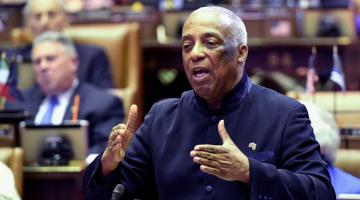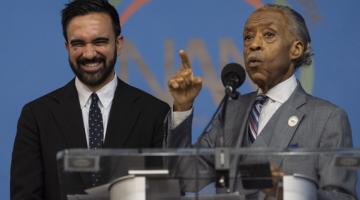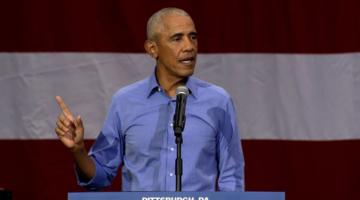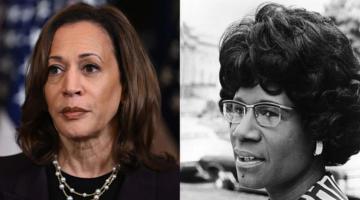Harry Haywood’s work is a guiding light to help Black people analyze our position in the U.S. and rethink how we might engage in electoral politics. Are we building power toward revolution or are we adding fuel to this destructive empire?
Originally published in Grassroots Thinking.
On January 20, 2025, Donald Trump will sit alongside Grover Cleveland as the only U.S. President to serve two non-consecutive terms. As Margaret Kimberley explains, the Democrats share a large portion of the blame, failing to move Biden aside early enough to run a viable candidate, giving Kamala Harris the Democratic nomination without any primary despite her weakness as a candidate. Harris’s courting of “Never Trump” Republicans, her refusal to even pay lip service to an arms embargo or ceasefire to end Israel’s war-intensified genocide in Gaza and aggression in Lebanon, and her overreliance on attacking Trump instead of offering up a viable platform. Her ability to out fundraise Trump, to the tune of $1 billion, was accompanied by few concrete policies that would garner support among increasingly immiserated working and poor people. Despite these numerous shortcomings, Black people voted overwhelmingly for Harris—78% of Black men and 92% of Black women—because she was the Democratic candidate, a woman, Blackish and because they saw the Trump alternative as far worse.
Organizer Abbas Muntaqim rightfully argues that this loyalty to the Democratic party does not serve us, not least because neoliberal identity reductionism has become the party’s key strategy. This pimping of and pandering to identity has outlived whatever utility it had as economic considerations weigh heavily on the minds of the masses. Harris employed the “Obama Plan” from the launch of her campaign, Muntaqim explains, relying on the clout of “cultural jesters” like Glorilla, Beyonce, Megan the Stallion, and Usher to drum up support for a lukewarm campaign. Giving speeches at Howard University and using rhetoric about the “historic progress” of the Biden administration were likewise used to “activate an African-amerikan base and a base of women generally to be further entrenched into the democratic party, not particularly for just this election, but for elections to come in the future.” Muntaquin analyzes further that, ironically, this vapid culturalist strategy was rolled out alongside an effectively conservative campaign that would have the broader effect of moving the entire party further rightward, with the effect of eradicating any self-proclaimed progressive forces.
What has become abundantly clear is that the Democratic Party not only fails to provide an effective strategy for alleviating the exploitation, oppression, and suffering of Black people, but it also actively stifles the struggle for Black liberation. As such, Black people need to fundamentally rethink our overwhelming loyalty to a party that offers us little more than candidates who play basketball, carry hot sauce in their bags, and wear Chuck Taylors.
Harry Haywood’s 1948 text Negro Liberation anticipates many of the insights made by Kimberly and Muntaqim about the ways ruling class politics and Black liberation are diametrically opposed. Haywood, a founding member of the African Blood Brotherhood, an early Black member of the Communist Party USA, and the key architect of the Black Belt Nation Thesis understood that a liberated people required land and freedom, self-determination and an anti-imperialist struggle. Below are eight quotes from Negro Liberation that offer us a way of understanding the recent election—and guidance on how to move forward.
1. “Unfortunately, there are those among the Negro people whose acts and words help to conceal the true character of the course and policies which America’s present rulers would impose upon the country and world. They would minimize the mortal threat of this course to the Negro and thus deliver him disarmed and helpless to the tender mercies of the enemy. They would dull the sharp edge of the mass struggle for Negro rights by distorting its aims, by setting before it narrow and illusory goals and thus isolate the Negro from his true allies in the struggle against the common enemy—American imperialism.”
Haywood provides a useful critique of the Black misleadership class that applies to Kamala Harris and other Black folks legitimizing Joe Biden and the Democratic Party’s militarized, neoliberal, genocidal domestic and foreign policy. These “handkerchief heads” include Linda Thomas-Greenfield, Lloyd Austin, Karine Jean-Pierre, Cedric Richmond, and Michael Regan. Regan, the first Black man to lead the Environmental Protection Agency, made the statement that “Diverse leadership is extremely important because this is a democracy and, in order for a democracy to work, its leadership should reflect the people that it represents.” He conveys how certain Negroes indeed help to conceal the true nature of the U.S. ruling class by contending that diversity, not imperialism, is the foundation of U.S. democracy. As such, giving folks from marginalized races and genders the opportunity to perpetuate violence and domination domestically and abroad is quintessentially democratic. Peddling the idea that having a few “chips in the cookies” expresses the needs and will of Black people not only obfuscates the necessity of an anti-imperialist framework, but also aims to de-radicalize, deceive, and “disarm” those who are disproportionately houseless, hungry, disenfranchised, and incarcerated.
2. “The facets of Negro liberation are manifold and varied. Any leadership striving to blend these varied endeavors into a composite weapon striking for complete Negro freedom must recognize imperialism as the main irreconcilable enemy. The program and tactics of such a leadership must be governed by the aim of mobilizing the Negro people against that enemy.”
Similar to the quote above, Haywood reminds us that U.S. imperialism is the primary contradiction, and both Democrats and Republicans are invested in maintaining the vestiges of this crumbling empire. As such, any movement that is not adamantly anti-imperialist is inadequate for the task of Black liberation. Any united front or coalitional strategy in which we engage cannot shy away from the task of confronting U.S. imperialism. The suggestion that the solution to Black suffering is voting for the Democratic Party, then “holding their feet to the fire” or “pushing them left,” is an attempt to throw dust in the eyes of the people. Kamala Harris was clear about her commitment as President to maintain U.S. imperialism, and was willing to fund as many police, prisons, military bases, and weapons deals it took to do so. Thus, as Haywood states, Black people must be organized and mobilized against imperialism, which includes both factions of the duopoly.
3. “It is however a political truism that the criterion of a social movement lies not primarily in its stated aims but rather in the social class make-up of its leadership and consequently in its practical activities.”
This “political truism” speaks to the hostility of Kamala Harris—and the Democratic Party writ large—to social movements. Black Democratic mayors called in police to brutalize protestors in 2020. Liberal university administrations called in police to tear down and terrorize student encampments in the Spring of 2024. Politicians across the political spectrum continue to accuse those who oppose genocide and support Palestinian liberation of antisemitism and domestic terrorism. Because U.S. politicians at all levels generally support and represent ruling class interests, the movements that frontload the interests of the working class, the colonized, students, youth, and other marginalized folks pose a threat to their power. This quote is also a reminder of the pitfalls of petit-bourgeois leadership in movement because such leadership is ultimately invested in reformism. The Black Alliance for Peace makes it plain: “As we organize in political spaces controlled by Black democrats, it would be suicidal if we did not understand the role these neocolonial puppets play – primarily against any organized opposition – in the war that capital is waging against the people… This corrupted Black petit-bourgeois professional/managerial class, positioned in government, corporate and non-profit sectors, provides the buffer and role models for individual material advancement at the expense of the Black working class.”
4. “The current upswing of racism in the United States is utilized by monopoly capital in the drive toward fascism and its by-product, war. In the United States, perhaps more than anywhere else in the world, a far-flung system of racial persecution, springing from the mire of chattel slavery—with strong survivals up to the present day—provides an even more fertile soil than Hitler had.”
This quote highlights the durability of the confluence of racism, war, monopoly, and fascistic tendencies in the United States given its capitalist racist foundation. Haywood’s comrade William Patterson made this relationship concrete in ways that resonate today. He argued that the fascistic character of the United States was especially manifest in unpunished government, police, and civilian violence against Black people. What he called “monopoly’s way of life and death” constituted linked forms of fascistic terror including “pogroms” in Columbia, Tennessee, Monroe, Georgia, and Groveland, Florida; the “legal lynchings” of the Martinsville Seven, Willie McGee, Edward Honeycutt, Milton Lewis Wilson, Rosa Lee Ingram, the Trenton Six, Robert Mallard, and Wesley Robert Wells; the antiradical repression of W. E. B. Du Bois, William Patterson, Benjamin J. Davis, Pettis Perry, and Claudia Jones; and the attempt to first murder Paul Robeson in Peekskill, New York, then to cancel his passport rights. These were not the crimes of individuals, but rather of the government and the powerful men who used their political power to the end of repression. Such violence permeated the “administrative, judicial and legislative branches of city, state and federal governments,” which “deliberately and in concert” employed fascistic tactics to protect the capitalist racist order. In 2024, we are also witnessing the simultaneous rise in antiblack violence; US warmongering from Southwest Asia to Eastern Europe; the concentration of monopoly in important industries including airlines, communications, food production, tech, and biopharmaceuticals; and fascistic tendencies, from the repression of social movements to anti-immigrant policies rooted in increased xenophobia to the normalization of white nationalism. Importantly, these conditions persist irrespective of which political party is in power.
5. “The fact is that every time the people have tried to improve their conditions fundamentally or have attempted to take their destinies into their own hands, or put the stamp of their needs and interests on the course of development, their action was immediately condemned as communism…”
Across the U.S. political spectrum, the threat of socialism, communism, and Marxism are used to attack and discredit social movements aimed at creating better conditions for racialized, working-class, and poor people. When the masses organize to stop cop cities, to curb the exorbitant funding of police and the war machine, against war-intensified genocide, for racial justice, and the like, those elected to ostensibly represent the people instead create boogeymen to distract from the real problem. Alongside communism, charges of collusion with Russia and domestic terrorism have become predominate means of criminalizing those who advocate and agitate for self-determination. The indictment and conviction of the Uhuru Three, deplatforming of African Stream, criminal conspiracy charges against Stop Cop City activists, Sinophobic “outside agitator” and “foreign influence” discourse levied against racial justice activists and anti-war activists, and attacks on the student intifada as terrorist sympathizers all highlight the ways that both parties, at the state and national level, are deeply hostile to radical mass movements.
6. “‘White supremacy’ means the nation’s greatest proportion of tenants and sharecroppers, its highest rate of child labor, its most degrading and widespread exploitation of women, its poorest health and housing record, its highest illiteracy and lowest proportion of students in high schools and colleges, its highest death and discase rates, its lowest level of union organization and its least democracy.”
Haywood’s assessment of white supremacy remains poignant. Referencing the U.S South, he argued that the degradation of poor white people was inextricably linked to the superexploitation of Black people—that anti-Black subjection was in fact the root of poor white debasement. This is important to keep in mind given the bipartisanaggression toward, for example, migrants, constructed enemies in the global south like Cuba, Venezuela, and China, radical organizers and activists, and affirmative action in higher education further the repression of everyone. The same elected officials who seek to disenfranchise marginalized voters and to criminalize individuals, organizations, and non-profits that challenge the neoliberal status quo are the same officials that reject federal funding for disaster relief, legislation to curb climate catastrophe, and caps on the cost of prescription drugs. People like Jonathan Metzlhave documented how “racial resentment”—or more accurately, white supremacy—undergirds terrible material and health outcomes for minoritized folks and those supportive of their demise alike.
7. “This essentially revolutionary character of the demands of the Negro soil cultivator arises from the semi-slave economic and political setup in the region. There every demand leading in the direction of democracy becomes at once a challenge to the feudal privileges of the bourbon ruling caste and is immediately countered by terror and the wildest racist provocation.”
Haywood reminds us that the struggle for Black liberation emanating from the working and toiling masses—not the bourgeois comprador or petit-bourgeois buffer classes—are effectively revolutionary in character. This means that no political party can accommodate this struggle, and in fact will only serve to co-opt, undermine, and/or criminalize its revolutionary character. This is because the organized, disciplined action of Black people would upend the structuring political economy and social relations of the United States. While the types of labor in which U.S. Black people engage have changed from the first half of the twentieth century, we continue to be hounded by unemployment and underemployment, overrepresented in “unskilled” and service work, overrepresented in the worst and most precarious labor, and locked in conditions of virtual servitude in penitentiaries. These economic realities are accompanied by the relatively low status of Black people, manifested in warehousing in ghettoes and prisons, extremely poor health outcomes, treatment with disrespect and distrust, and the like. The resolution of these deeply rooted and continually reproduced realities is rejection of the duopoly and revolutionary action. It is also important to take seriously Haywood’s point that any challenge to Black subordination is met with racist violence. This means that self-defense in its manifold forms is an essential component of revolutionary struggle.
8. “The psychological as well as the economic need for continuous struggle to gain equal democratic status, to throw off the oppressive chains and assume the upright posture of a free people—this is and has been the dynamic of Negro culture.”
This quote provides a powerful rebuttal to people who claim “our ancestors died for the vote” to berate those who, in their expansive understanding of what constitutes politics, made the political choice to abstain from voting. Our ancestors in the belly of the beast struggled for liberation and democratic rights, self-determination and dignity—struggles which included but were not limited to the franchise. Black people have always understood the need to use every method possible to fight super-exploitation and domination, and this includes making a conscious decision to divest from the duopoly, withholding votes from a party perpetuating war-intensified genocide, and/or focusing energy and attention on politics beyond the ballot box. While voting is one strategy for the struggle over resources and power, attaining “equal democratic status” requires that we build real power. The latter is our only lifeline, as Black liberation will never be on the ballot.
Nearly eight decades before the 2024 U.S. presidential election, Harry Haywood gave us a durable analysis that can help us makes sense of the failure of the Democratic Party to defeat an aspiring authoritarian, and what their ongoing race to the right means for Black folks. Among other things, he warned about the misleadership of prominent Negroes, insisted on the centrality of anti-imperialism to any Black politics, analyzed the relationship between white supremacy and terrible material conditions, pointed out the weaponization of anticommunism to crush mass movement, and made the important connection between racism, fascism, and war. This is why we must continue to study, learn from, and build upon radical Black organizers and theorists and reject identity reductionism, intersectional imperialism, lesser-of-two-evilism, and any other politic that deters us from the urgent task of building power to the end of Black liberation. Our lives depend on it.
Dr. Charisse Burden-Stelly is an Associate Professor of African American Studies at Wayne State University.



















